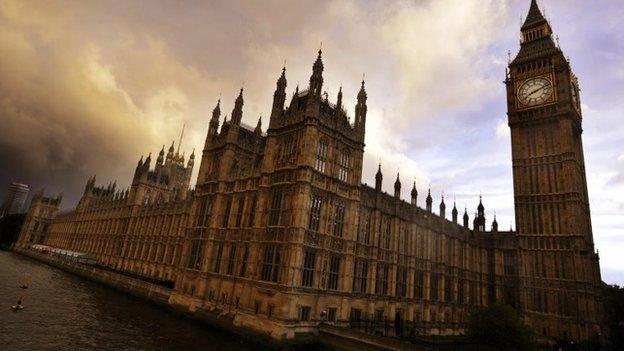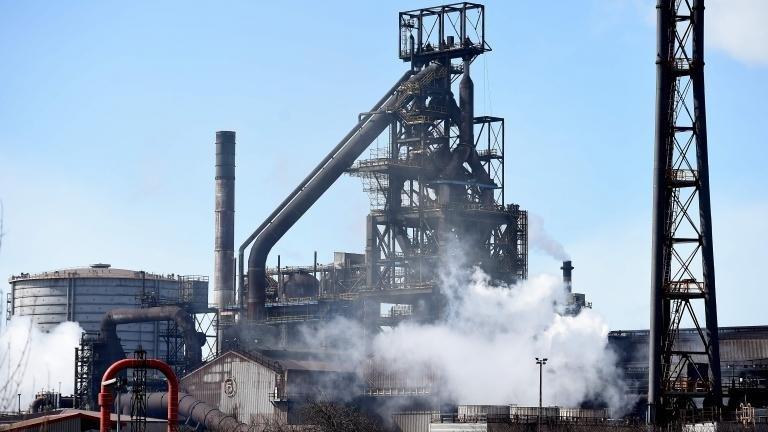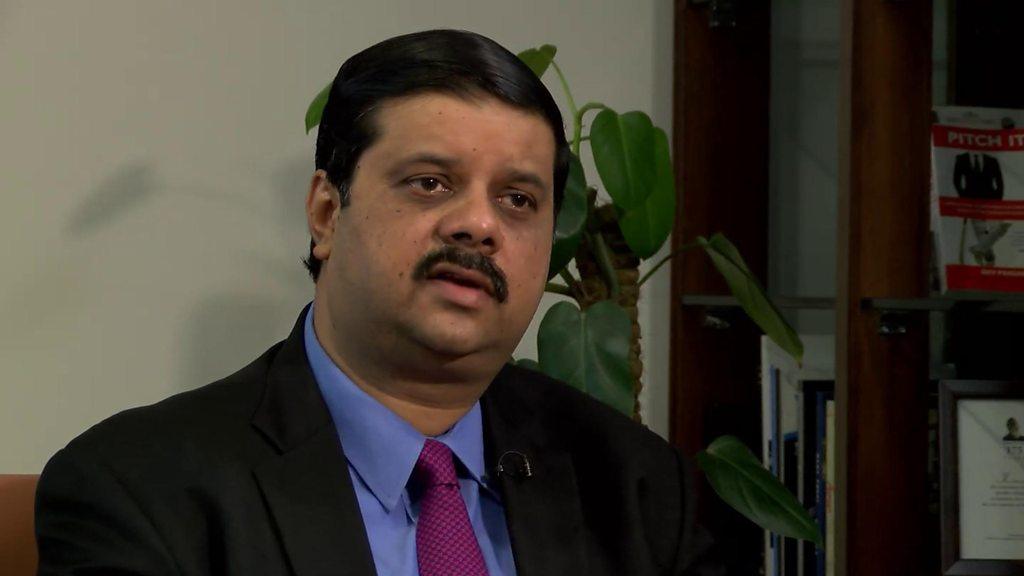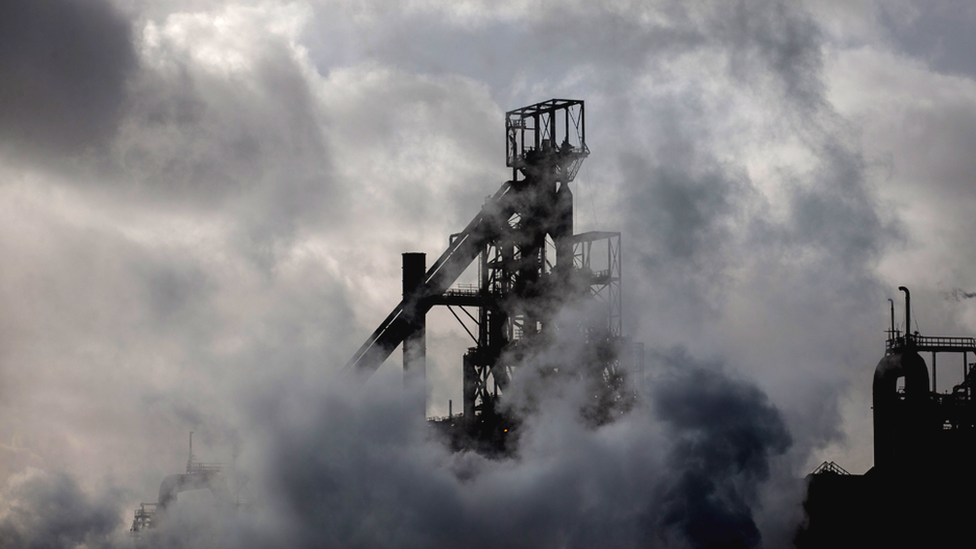Tata Steel: No 10 rejects Labour call to recall Parliament
- Published
Jeremy Corbyn visited Port Talbot on Wednesday
The government has no plans to recall Parliament to discuss the crisis facing the UK steel industry, No 10 has said.
A Labour petition, external calling for MPs to return to Westminster to discuss the fate of the Port Talbot steelworks has obtained more than 45,000 signatures.
Jeremy Corbyn told Tata Steel workers they were "not expendable on the altar of a global corporation" and urged ministers to intervene to save jobs.
David Cameron will chair a meeting of senior colleagues on Thursday.
Business Secretary Sajid Javid is returning early from an official trip to Australia to lead the government's response although it is not clear whether he will attend Thursday's meeting.
Business Secretary Sajid Javid says UK steel industry is "absolutely vital" for UK
Mr Javid, who arrived in Sydney on Tuesday for what was due to be a three-day trade visit, said it was vital steelmaking continued at Port Talbot but played down talk of the business and Tata Steel's other remaining UK assets being taken into public ownership, saying there were "buyers out there".
Ministers say they are considering "all options" for the Port Talbot plant after owners Tata Steel said it wants to sell it and the rest of its loss-making UK business.
The Port Talbot plant employs 5,500 of Tata UK's current 15,000-strong UK workforce.
The Welsh Assembly has been recalled to discuss the crisis, and will meet on Monday. Parliament is due to return on 11 April after the Easter recess.
Late on Tuesday, after a board meeting in Mumbai, Tata Group said it planned to sell the UK steel business, asking its European holding company to "explore all options for restructuring".
The decision also affects workers at its other UK plants, including Rotherham, Corby and Shotton. There has been no specific mention of these plants from the government.
Ministers are concerned Tata could seek to close the Port Talbot plant within weeks if a buyer is not found.
It is understood the government is looking at offering loan guarantees to potential buyers and much tighter rules on procurement to ensure major British projects are obliged to buy british steel.

Recalling Parliament

The Commons Speaker must approve the recall of Parliament
During times when MPs are not sitting, the Speaker can, if asked by the government, decide to recall the House of Commons. Recent examples include:
September 2014 (air strikes against so-called Islamic State in Iraq)
August 2013 (chemical weapons in Syria)
April 2013 (following the death of Baroness Thatcher)
August 2011 (amid riots in London and other cities)

Labour shadow business secretary Angela Eagle told BBC News the government should step in and buy the steel plant's strategic assets to ensure they are "kept for the nation" if no buyer can be found.
"The government should know that if this industry is left to die it will cost a lot more in the long run… It will devastate those communities," she added.
'Failure to intervene'
During his visit to Port Talbot, Mr Corbyn said the livelihoods of thousands of workers were at stake and called on the government to guarantee that steel made in Port Talbot was used in public procurement projects, such as the railways and construction.
He also called on the Chinese government to end its "disgraceful" dumping of cheap steel in European markets, saying the practice was against world trade regulations.
Tata chief Koushik Chatterjee: "We've taken a significant amount of impairment"
Mr Javid insisted that he had been in contact with Tata Group executives and believed a buyer could be found for its UK business, hinting that the UK would be willing to provide "commercial support" to facilitate a deal.
No 10, meanwhile, said its focus was on "finding a long-term sustainable future for steel making at Port Talbot and across the UK" and Parliament would not be recalled.
"Ministers will continue to hold briefings to update representatives of other parties... but we have no plans to recall Parliament," a Downing Street spokesman said.
'Open-minded'
There are a growing number of Conservative MPs saying the government should step in and intervene if a buyer could not be found.
Tom Pursglove - whose Corby constituency includes one of the Tata plants - said he was "one of the biggest free-market Conservatives you will find", but added: "I don't think we should rule anything out," saying the industry was of vital economic interest.
The MP said the UK needed to ensure it retained a steel industry for self defence, so in any future war the UK could manufacture its own armaments.

Steel and the EU debate

BBC political correspondent Carole Walker
If Britain were to leave the EU it would certainly have greater freedom to impose anti-dumping tariffs. But Britain's steel industry is closely tied to the EU - exporting some three million tonnes of steel products last year.
Outside the EU, the British steel industry could itself face punishing tariffs, depending on what sort of deal could be negotiated.
It is worth noting that many of the measures the steel industry is seeking could be implemented by the British government: lower business rates, a relaxation of carbon emissions targets for heavy manufacturers, more compensation for high energy prices, and a commitment that British steel is used in major construction projects.
But the future of British steel has already become another important issue in the debate over whether we would be better off in or out of the European Union.

David TC Davis, chairman of the Commons Welsh Affairs Select Committee and a former British Steel worker, said he "wasn't against the idea at all".
"We do need to have a viable steel industry in this country, it's very important from a defence point of view. I'm perfectly open-minded about that but it's got to be profitable in some way," he told Radio 4's World at One.
The European Commission said the UK government had not been in contact regarding the possibility of state intervention.
Cheap steel imports from other countries, such as China, have been partly to blame for the crisis. Tata Steel has also cited the high manufacturing costs in the UK.
Tata announced more than 1,000 job cuts, including 750 in Port Talbot, in January. Last October, it said nearly 1,200 jobs would go at plants in Scunthorpe and Lanarkshire.
- Published30 March 2016
- Published30 March 2016

- Published30 March 2016

- Published30 March 2016
